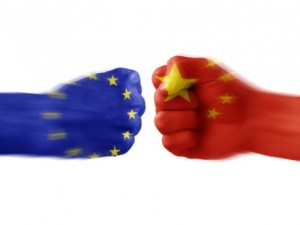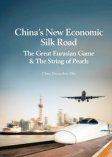EU Ambassadors, China Policy Advisors’ Myopia Misses the Point of Belt and Road


The China ambassadors of all European Union countries – with the sole exception of Hungary – have apparently issued a report that sharply criticizes China’s “Silk Road” project, denouncing it as designed to hamper free trade and put Chinese companies at an advantage.
The report, first commented on and apparently seen by Handelsblatt Global said the plan “Runs counter to the EU agenda for liberalizing trade and pushes the balance of power in favor of subsidized Chinese companies.” The comments were allegedly made as part of the preparations for an EU-China summit scheduled to take place in July. The EU Commission is working on a strategy paper to forge a common EU stance on China’s prestige project to build roads, ports, and gas pipelines to connect China by land and sea to Southeast Asia, Pakistan, and Central Asia and beyond to the Middle East, Europe, and Africa. China’s new Silk Road will run through some 65 countries in six economic corridors. The comments, if correctly reported, indicate some erratic behaviour as well, as some of the EU nations who have had their ambassadors sign this report, have also signed up to the Chinese Belt & Road MoU. If correct, that implies a worrying lack of Chinese policy consistency within the countries concerned.
Ambassadors to China are hardworking (and often understaffed) professionals, albeit not always with precise China knowledge or expertise. They are consequently often supported in their roles by a variety of advisors, drawn from political science, business, and diplomatic circles. However, in this instance, if the report is correct, it would appear it has concentrated too much on the potential political shortcomings, rather than any attempt to see the visionary aspect or commercial impact that infrastructure projects aligned with China’s Belt and Road Initiative could deliver.
According to the Handelsblatt report, the EU stance has apparently been that “We shouldn’t refuse to cooperate but we should politely yet firmly state our terms.” according to one EU diplomat, adding that Chinese firms “must not receive preferential treatment” in the awarding of public contracts.
A German economics ministry official was also quoted as saying the Silk Road initiative “Must take account of the interests of all participants” and was still a long way off. In their report, the ambassadors apparently wrote that “China wants to shape globalization to suit its own interests. At the same time the initiative is pursuing domestic political goals like the reduction of surplus capacity, the creation of new export markets and safeguarding access to raw materials.” They warned that European companies could “fail to win contracts” if China isn’t pushed into adhering to the European principles of transparency in public procurement, as well as environmental and social standards. EU officials have also said that China has been trying to “divide Europe” to strengthen its hand in relations with individual member states. In this instance, countries such as Hungary and Greece, which have received Chinese infrastructure investment, have, according to the EU, shown they are malleable to pressure from Beijing.
Whenever European politicians travel to China nowadays they’re put under pressure by their hosts to sign agreements for the joint expansion of the Silk Road. “This bilateral structure leads to an unequal distribution of power which China exploits,” the report apparently stated. A copy of the MoU that countries are often asked to sign can be viewed in this article.
Criticism was also leveled at China in that Beijing has yet to provide exact information on which foreign firms have so far directly benefited from the China’s Belt & Road Initiative development program. The US$40 billion Silk Road Fund was set up in 2014 to invest in countries along the road but it’s unclear who is eligible for investment, and on what terms. A German study released in February by the government’s GTAI foreign trade and investment marketing agency and the Association of German Chambers of Commerce and Industry concluded that the Silk Road project was often focused on politically unstable countries with uncertain legal frameworks. GTAI’s managing director said that around 80 percent of projects funded by Chinese state banks had gone to Chinese companies in the past, while German government papers seen by Handelsblatt conclude that China isn’t interested in transparency when it comes to procurement. Last May, when former German Economics Minister Brigitte Zypries traveled to Beijing for the launch of the Belt & Road Initiative, she and other EU officials were meant to sign a joint declaration with the Chinese government. It didn’t happen. The Europeans wanted to change much of the agreement’s wording, saying it should guarantee “equal opportunities for all investors in transport infrastructure” as well as international standards of transparency. The Chinese refused to incorporate any amendments.
That is quite a list of grievances. Beijing, for its part, has had its Foreign Ministry state that the “The EU has clarified the issue and that the Handelsblatt report was inaccurate.” although no record on this statement can be seen on the EU website. Hua Chunying, the Ministry Spokesman, stated “China has noticed the relevant report. As far as I know, the EU has clarified this to China. The relevant report from Handelsblatt does not conform to the facts.”
However, it does seem China will be in for a rocky ride at the EU-China summit, while certain parts of the report seem to ring true, such as Hungary’s refusal to sign it. While it is not my intention to deal with what could be fake news, Handelsblatt are a credible publishing house, established back in 1946. The Handelsblatt Global Edition, which leaked the report, aims to reach an international audience interested in German business and finance news. The editor-in-chief is Andreas Kluth, and it publishes five days a week from its editorial office in Berlin. Clearly, it appears someone has had access to something. The “inaccuracy” referred to by the Chinese Foreign Ministry has also remained unspecified, suggesting that the basic premise of the report is probably true.
The omission of Hungary in not signing up to any statement that was being prepared is of interest and also rings true because the country has had issues with perceived “EU interference” concerning the development of a Budapest-Belgrade rail link. Hungary is part of the EU, with its capital city of Budapest, while across its Eastern border lies its neighbour Serbia, which is not an EU nation. The Chinese have agreed to fund and help build the link, and has been getting on with the job in Belgrade, however the EU has stepped in to query the transparency of the project tenders for the portion that runs into Hungary through to Budapest. Brussels has insisted that tenders be transparent and not favour Chinese companies. Understandably, Budapest is somewhat annoyed, and so are the Chinese, who are financing the thing. The crux of the alleged EU Ambassadors complaints against China is that they are only interested in the Belt & Road under terms that will see their own companies develop and build the infrastructure, and that EU companies are essentially locked out of the process.
This is in essence true. However, EU businesses are often unable to compete with Chinese contractors. The Chinese can provide the raw materials, the designs, and (when permitted) even the labour to develop such infrastructure. Simply put, they get things done. The EU’s apparent position is that this shuts out any EU companies from taking part. In this case, again, this is true, but only up to the perspective of the infrastructure project itself. The EU is failing to see the bigger picture – which are the opportunity benefits that infrastructure itself brings to the table. In this case, it is irrelevant who builds these projects, and if the Chinese are willing to do the work, finance and build it, then in my opinion, so be it. The entire point of the Belt & Road – and Germany’s GTAI have already concluded that 80% of such development projects went to Chinese contractors – is the opportunity having such infrastructure in place will bring. In which case, if the Handelsblatt report is correct, the EU ambassadors concerned have been unable to see past their own policy advisors, their own national MNC’s lobbying blindly for “China projects” and smell the good news. The Belt & Road Initiative delivers infrastructure. It is entirely the remit of the EU – and any other participating nation – to work out themselves how best to take advantage of that.
No-one is getting in the way of this, and certainly not the Chinese. It is a lack of vision of behalf of those tasked with understanding Chinese policy that suggest the entire Belt & Road Initiative is only a political statement, and one to be wary of. Of course diplomatic and security concerns need to be taken into consideration. But it is a mistake to dismiss altogether the commercial impact potential that such infrastructure also delivers. In this, the EU report has completely missed one of the most important component parts of the entire Belt & Road project.
There has, in both diplomatic, policy and most media analysis of the Belt & Road Initiative, been a complete misunderstanding of what these projects mean, and a certain type of laziness involved. Everyone has been looking at how they can match or partner the Chinese in getting a slice of the infrastructure projects only. They haven’t been paying attention to how they can use that infrastructure once it is in place. In fact, that is the more rewarding and financially attractive part of the equation.
Hungary is a prime example; the country wants the Budapest-Belgrade rail link build because it will enhance Hungarian-Serbian trade. It cuts the travel time from 8 hours to 3. There have been numerous EU comments about the line, with some media suggestions that it will take Hungary “2,400 years to break even” on their €3 billion investment into the project, suggesting annual profits will remain fixed at just €1,250,000 per annum over that entire period. Clearly, such comments are absurd. I haven’t seen any business plans on how the line will improve trade, however I am sure that given the essential dynamics, human enterprise and entrepreneurial instincts will kick in. Once the line is there, people will use it. As we have seen many times before, the public demand and usage of new roads and railways often far exceeds the original anticipated demand. I do not believe the EU Ambassadors have looked in any way at the opportunity benefit to Hungary of this project. They have been too concerned about the tender process, and making accusations of China using Hungary to “break up” the EU to justify their own interference. Budapest is alarmed, and rightly so, at what it sees as a national project involving a close neighbor, being caught up in Brussels bureaucracy. It has become a struggle for control and influence, where it should be an overview of how best to utilize the railway.
Another example, albeit non-EU, is the issue of the Hambantota Airport in Southern Sri Lanka. China critics have pointed to how it is standing empty, is a white elephant and has loaded the country up with debt. As I pointed out here the reason the airport remains underused is a local political issue and nothing to do with the Chinese – although they must be getting fed up of having to deal with democratic countries right now. Once the airport is operational however, southern Sri Lanka will experience a tourism boom. In fact this has already begun, in expectation of that occurring. The cost of building the airport – which cuts 30 minutes off flying time when heading to Sri Lanka from Asia, and a further 3-5 hours driving time to reach the south-eastern resorts – is far outweighed by the economic benefits the tourism industry will bring. The Chinese aren’t investing in that, but Sri Lankan civil engineers, architects, landscapers will all have a field day, as will regional textiles, woodworking, and related manufacturing and supply industries while local employment of chefs and everyone from hotel managers to accounts clerks, travel agents, airlines, car hire firms, to bellboys and dive instructors will all find employment, career and business opportunities. The potential, sustainable fiscal income for developing that far outweighs the one-off project expense of building the airport. It is therefore largely missing the point as to who gets to build the Belt & Road infrastructure. If the EU Ambassadors and their advisors, as suggested by Handelsblatt only concentrated their opinions on just that, then they will be lacking the policy vision to see the bigger picture. The answer to getting foreign investors and national businesses into the Belt & Road is this: look at the developed infrastructure opportunity. What industries will benefit in either supporting new infrastructure, or are ideally placed to take advantage of it?
EU Ambassadors and their advisors would be better spending their time commissioning commercial impact reports on how to take advantage of the infrastructure being offered, not beating up the Chinese for having the vision to suggest it. One can over-politicise matters concerning China, and when dealing with national self-interests. It is time to cease concentrating solely on the political baggage of China’s Belt & Road Initiative, and begin to appreciate the implications of Belt & Road infrastructure and its potential benefits, and working out how to utilize – and profit – from them.
Finally, none of the EU report appears to contain any reference to how EU businesses may even start to use that infrastructure to sell to China. And with over half a billion Chinese already buying from e-commerce platforms surely that is a second issue worth exploring – selling goods, using the new infrastructure developments – to Chinese consumers. It is time for the EU to wake up, smell the coffee, properly understand what is being delivered to them when it comes to the Belt & Road and start using the final word in “BRI ” – Initiative.
About Us
Silk Road Briefing is published by Dezan Shira & Associates. The practice advises foreign investors in Asia and can provide business intelligence, feasibility studies, market entry, as well as legal, tax advisory and support services such as risk assessment, HR and compliance to foreign investors throughout Asia. Please contact us for Belt & Road advisory services at silkroad@dezshira.com or visit us at www.dezshira.com.
 Related Reading:
Related Reading:
Silk Road and OBOR Business Intelligence
Dezan Shira & Associates´ Silk Road and OBOR investment brochure offers an introduction to the region and an overview of the services provided by the firm. It is Dezan Shira´s mission to guide investors through the Silk Road´s complex regulatory environment and assist with all aspects of establishing, maintaining and growing business operations in the region.
China’s New Economic Silk Road
This unique and currently only available study into the proposed Silk Road Economic Belt examines the institutional, financial and infrastructure projects that are currently underway and in the planning stage across the entire region. Covering over 60 countries, this book explores the regional reforms, potential problems, opportunities and longer term impact that the Silk Road will have upon Asia, Africa, the Middle East, Europe and the United States.
Cross Border e-Commerce in China
While cross border e-commerce (CBEC) is an attractive channel for foreign businesses to sell to China, misunderstandings over how CBEC in China works frequently end in costly disappointments and retreats from the market. In this issue of China Briefing magazine, we offer foreign investors a practical guide to selling to China through CBEC. We begin by introducing the market landscape, before diving in to the sector’s legal and regulatory framework. We then compare the advantages and disadvantages of different CBEC business models. Finally, we consider how to protect intellectual property in China when selling online.
Dezan Shira & Associates and the European Union
In 2017 our firm Dezan Shira & Associates turned 25 years old in Asia. We are an independent professional services firm, and one of the primary brands in this field in the region.









